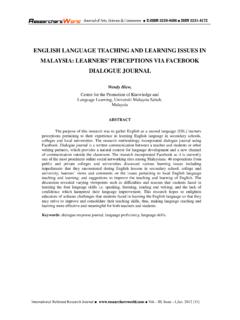Transcription of Journal of Management - Alessandro Palazzini
1 Of Management DOI: 2005; 31; 829 Journal of ManagementDaniel C. Feldman and Melenie J. Lankau Executive Coaching: A Review and Agenda for Future The online version of this article can be found at: Published by: On behalf of: Southern Management Association can be found at: Journal of Management Additional services and information for Email Alerts: Subscriptions: : : Citations by Paula Figueiredo on April 2, 2009 from of Management / December 2005 Feldman, Lankau / Executive CoachingExecutive Coaching: A Reviewand Agenda for Future Research Daniel C. Feldman*Melenie J. LankauTerry College of Business, Department of Management , the University of Georgia, Athens, GA 30602 The use of executive coaching as a developmental intervention for managers has increased dra-matically during the past decade.
2 Consequently, there has been a burgeoning practitioner litera-ture on the topic of executive coaching. Empirical research on executive coaching, however, haslagged far behind, and theoretical work on the processes underlying effective coaching has beenlimited. In this review, we investigate the construct of executive coaching and examine howcoaches professional training, client characteristics, and types of coaching impact the effective -ness of this intervention. The article concludes with an agenda for future research on thisemerging form of Management :executive coaching; executives; coaching; developmental relationshipsAlthough executive coaching has been defined in a variety of ways by different authors,researchers typically define it as a short- to medium-term relationship between an executiveand a consultant with the purpose of improving an executive s work effectiveness (Douglas &McCauley, 1999; Feldman, 2001).
3 In the past decade, the prevalence of executive coaching incorporations has risen dramatically as an alternative to conventional executive training(Filipczak, 1998; Kilburg, 1996; Quick & Macik-Frey, 2004). Hall, Otazo, and Hollenbeck(1999) estimated that there are currently tens of thousands of professionals offering coaching Authorship is alphabetical; both authors contributed equally to the research. The authors wish to thank Manuel Lon-don for his helpful feedback on an earlier draft of the article.*Corresponding author. Tel: 706-542-9387; fax: address: of Management , Vol. 31 No. 6, December 2005 829-848 DOI: 2005 Southern Management Association. All rights by Paula Figueiredo on April 2, 2009 from services.
4 For instance, the International Coaching Federation, a Washington, basedassociation of personal and business coaches, has seen its membership double to 7,000 mem-bers in 33 countries within a 2-year period (Johnson, 2004). Companies like Motorola, IBM,and Bristol-Myers Squibb routinely offer coaching as part of their executive developmentprograms (Elder & Skinner, 2002; MacRae, 2002).A growing body of literature has emerged on executive coaching from the fields of man-agement consulting, training and development, and consulting psychology (Kampa-Kokesch& Anderson, 2001). This literature, largely taking a practitioner perspective, has differentiatedexecutive coaching from other types of helping relationships, illustrated various types of exec-utive coaching relationships, outlined steps of coaching interventions, and proposed potentialoutcomes associated with successful executive research on executive coaching, though, has lagged far behind the practitionerliterature.
5 There have been fewer than 20 studies that have investigated executive coachingwith systematic qualitative and/or quantitative methods. These studies establish the possibilityand plausibility of the potential positive benefits of executive coaching. However, there is verylittle theoretical research that examines how or why executive coaching should work, when itwill be most (or least) successful in changing executives behaviors, and under which condi-tions executive coaching will translate into greater organizational purpose of this article is to provide directions for future research and theory develop-ment in the area of executive coaching. Specifically, the major goals for this review are to: (a)define and differentiate executive coaching from other constructs; (b) identify potential out-comes from executive coaching; (c) integrate multiple theoretical perspectives on how andwhy the coaching process might work; and (d) identify individual, situational, and organiza-tional variables that may determine the effectiveness of executive coaching.
6 In doing so, wehope to provide a useful agenda for future theoretical and empirical research on Construct of Executive CoachingDefinitionAt its broadest level, coaching is generally defined as a process of equipping people withthe tools, knowledge, and opportunities they need to develop themselves and become moreeffective (Peterson & Hicks, 1995: 41). The notion of coaching as a developmental activity inthe Management literature is not a new phenomenon. In early studies on managerial roles(Mace & Mahler, 1958; Mintzberg, 1973, 1990, 1994; Yukl, 1994), coaching was primarilyviewed as a technique that managers could use to correctdeficienciesin employees task per-formance. More recently, coaching has also come to be viewed as a means offacilitatinglearningand moving executives from excellent performance topeak performance(Ellinger &Bostrom, 1999; Evered & Selman, 1989; Feldman, 2001).
7 Executive coaching per se emerged in the 1990s as an intervention geared specifically tochanging the behavior of middle- and senior-level managers. The failure rate among seniorexecutives in corporate America at this time was estimated at 50% (Hogan, Curphy, & Hogan,830 Journal of Management / December 2005 by Paula Figueiredo on April 2, 2009 from 1994), and many attributed the failures of senior executives to their poor leadership skillsrather than to their technical skills (Charan & Colvin, 1999; Dotlich & Cairo, 2003). To helpexecutives develop new leadership competencies, prepare for advancement, or cope withorganizational change, companies (and even some executives themselves) began contractingwith outside consultants to receive coaching (Greco, 2001; Niemes, 2002).
8 In the Management literature, Feldman (2001) identified the three key elements of execu-tive coaching relationships as follows: (a) It consists of one-on-one counseling about work-related issues; (b) it involves the use of 360-degree feedback on executives strengths andweaknesses as its starting point; and (c) its purpose is to improve managers effectiveness intheir current positions. Hall et al. (1999) similarly emphasized the importance of providingfeedback to executives and noted how infrequently executives receive critical feedback abouttheir personal and professional development. These elements are similar to those identified inthe consulting psychology literature (Kilburg, 1996).We should note that, in several organizations, managers have been encouraged to coachtheir subordinates as part of their job responsibilities.
9 Although we recognize coaching maybe a legitimatepartof a manager s job, here we will focus on consultants whoseexclusiveresponsibility is client coaching and who haveno formal authorityover Distinctiveness of Executive CoachingThe literature on executive coaching has differentiated this dyadic relationship from sev-eral other forms of helping relationships. Below, we consider its conceptual distinctivenessand overlap with advising, career counseling, mentoring, and an individual who shares his or her business acumen or functional expertisewith executives to assist them in planning or executing specific organizational actions. Advis-ing relationships typically focus on strategic or operational issues in the organization, such ashow to take a company public (Sperry, 1993).
10 In contrast, executive coaches do not assume therole of technical expert, are not contracted for traditional business consulting, and do not pro-vide recommendations on specific business initiatives (Miller & Hart, 2001).Career counselingis used to help individuals assess their strengths and weaknesses inorder to find the right job for them in theexternallabor market. Executive coaching, on theother hand, focuses on helping executives improve their performance on theircurrentjobs(Feldman, 2001; Greco, 2001). Also, career counseling involves a more comprehensive exam-ination of executives job preferences, values, interests, and personal life concerns, whilecoaching focuses exclusively on executives work-related skills and abilities (Feldman, 2001).


